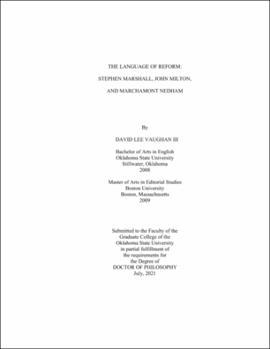| dc.description.abstract | This dissertation examines the language of reform in the work of Stephen Marshall, John Milton, and Marchamont Nedham during the 1640s when constitutional and ecclesiastical crises led to civil war. There are various narratives about the causes and consequences of the English Civil Wars, and this project assesses how language about reform underscores the search for a unified spiritual and political commonwealth during those tumultuous years. Marshall, the religious voice of Parliament, Milton, the vehement apologist and polemicist, and Nedham, the political opportunist and journalist, display complex linguistic and rhetorical practices that evoke the contentious and combative nature of the Civil War period. This study demonstrates how these authors seek a reimagined religious and political order and attempt to unify England in a stable spiritual, intellectual, or political community. Speaking from the parliamentary pulpit, Marshall insisted that reform required the individual salvation of the godly in order to form a stable, Protestant England. On the other hand, Milton claims that reform is best understood as an intellectual matter, and by focusing on the exercise of reason to discern ideas, he argues that an ordered polity requires rational Protestants to discover truth and enact virtue. Nedham’s view of reform embraces practical considerations about an educated political community, and though his political allegiance shifts several times during the Civil Wars, he uses the press to oppose civil strife, to educate the public, and to justify political stability. Examining the language in their sermons, pamphlets, and newsbooks reveals that ideas about reform emerge and change in response to the momentous events of the 1640s. Yet, while competing narratives of reform reinforce the complexity of the period, the language of Marshall, Milton, and Nedham indicates how reform becomes a locus for stability. | |
